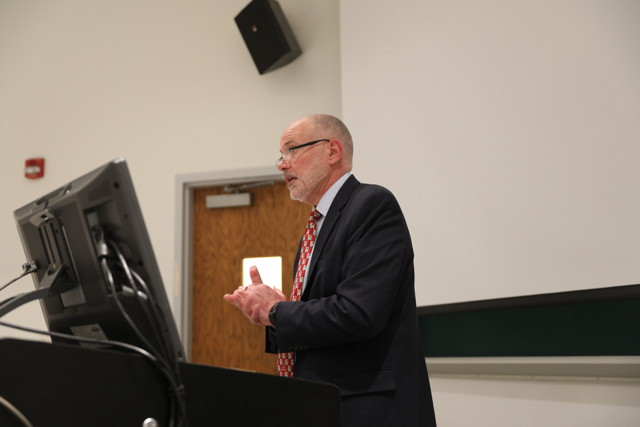Wednesday, Sept. 27, American Solidarity Party presidential nominee Peter Sonski spoke at the College of William and Mary’s Theodore Roosevelt Society meeting in Blow Hall.
According to the American Solidarity Party’s website, the ASP is a Christian Democratic party promoting pro-life ideas, social justice, environmental conservation and international peace.
According to the TRS Instagram page, the group is dedicated to conservative political and philosophical conversations and debates. TRS President Ben Frogel ’25 began the event by detailing the nature of Sonski’s chances at the American presidency.
“We promised you a candidate for president, and in some official sense, we have delivered,” Frogel said. “Some of us may be excited if we hear his name on election night coverage on November 30, 2024, but none of us expect to see him carrying a state. Why, then, has Peter Sonski made the trek all the way to Williamsburg? Hopefully, not so that I can insult his candidacy.”
Frogel noted the two-party nature of the American political system.
“Voting for a third party is an endorsement of a particular idea, a set of ideas that compromise that party’s platform — the third party candidacy then functions as a critique,” Frogel said. “The ASP cuts through normal American discourse by seeing the controversies surrounding organized labor, abortion, environmental protections and other issues with a consistently pro-life ethic.”
Sonski, who won the ASP’s primary earlier this year, currently serves as a member of the Regional School District 17 Board of Education in Connecticut. During the event, Sonski drew parallels between himself and President Theodore Roosevelt, noting that he felt the political culture of Roosevelt’s time was similar to the modern day.
Sonski then detailed his early life.
“I grew up in a blue collar household and registered as a Democrat at age 18, and I voted for Jimmy Carter, but I left the Democrat Party formally in the 1980s,” Sonski said. “In reality, it was the Democratic Party, the party of little guy, that left me, and it decided that the little guy in the womb was exposable.”
Sonski also referenced a Pew Research Center survey, citing Americans’ declining faith in politics. He said he entered politics at a time characterized by hyperpartisanship and dysfunction.
“Americans have long been critical of politicians and skeptical of the federal government,” Sonski said. “But today, Americans’ views of politics and elected officials are unrelentingly negative, with little hope of improvement on the horizon.”
“Americans have long been critical of politicians and skeptical of the federal government,” Sonski said. “But today, Americans’ views of politics and elected officials are unrelentingly negative, with little hope of improvement on the horizon.”
A Christian Democrat, Sonski has previously registered as both a Republican and a Democrat before joining the ASP.
“The ASP is about citizenship,” Sonski said. “The ASP’s roots are in Christian democracy.”
Sonski said Christian democracy would later develop in response to the rise of socialism and communism in Europe.
“In socialism, as well as in communism, we see a perversion of justice,” Sonski said. “The pursuit of equality in communists, who laid the framework of government tyranny that cut the role of legitimate right and property, as well as the role of religion in society.”
Sonski also criticized capitalism and liberalism, citing their overemphasis on individuality, profit growth and exploitation.
“Christian democracy falls into neither of these categories,” Sonski said. “[Rich and poor can] cooperate to create a true, just society.”
Sonski also emphasized the ASP’s commitment to the pro-life cause, but also to strong social welfare policies.
“The American Solidarity Party sees the protection of human life in conception until natural death, from womb to tomb,” Sonski said. “It doesn’t merely seek after laws to restrict abortions, but also demand a system of true support for families, including accessible and affordable health care for parents and children, including expanding Medicaid funding.”
Sonski said he would place the ASP as center-right on social issues and center-left on fiscal issues.
On international and military issues, answering a question from an attendee, Sonski said he supports sanctions against Russia, and providing defensive and humanitarian aid to Ukraine. But above all, he said he supports diplomatic measures to resolve the conflict.
While he cited former President Donald Trump’s indictments as a contributing reason to the decline in Americans’ faith in government, he credited Trump with creating the United States Space Force.
“The next war is going to be fought in outer space, so those are areas, of course, that we need to be focused on,” Sonski said. “If I can give Donald Trump credit for one thing, building a Space Force was probably prudent.”
“The next war is going to be fought in outer space, so those are areas, of course, that we need to be focused on,” Sonski said. “If I can give Donald Trump credit for one thing, building a Space Force was probably prudent.”
Sonski closed by recognizing that his candidacy was facing a lot of challenges as a third party, including gaining ballot access. Should his efforts not result in his relocation to Pennsylvania Avenue, Sonski said he still hopes the campaign helps advance the ASP’s goals and values under the two-party system.
Attendee Bennett Neale ’24 appreciated Sonski’s visit.
“I would not say I support the ASP’s positions,” Neale said. “But I thought he was incredibly well-spoken. And I guess most importantly, I like the consistency — seeing consistent ideology and politics is really refreshing at a time when, with the two-party system we have now, it’s just a vote against the other with almost no ideology or consistency at all.”

